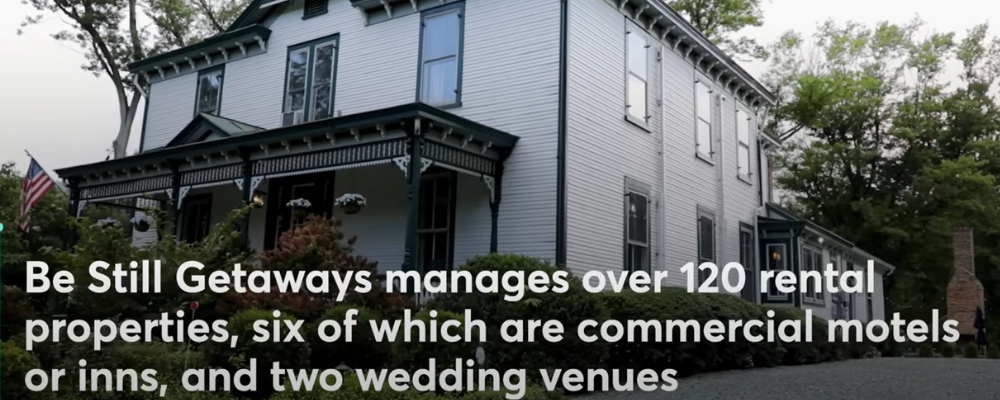Jamie Stark Inlow shares her inspiring journey from working in higher education to creating Be Still Getaways, a thriving property management and design business poised to generate $3 million this year. Learn how Jamie turned a side hustle managing a neighbor’s Airbnb into a full-scale operation managing over 120 properties, complete with a 4,000-square-foot warehouse and a dedicated team. From the sacrifices she made—like skipping her own paycheck to support her staff—to her innovative approach to luxury hospitality, Jamie reveals the highs and lows of scaling her business. With heartfelt reflections on entrepreneurship, family, and resilience. For anyone dreaming of turning their passion into a reality, watch the full video and dive deeper into Jamie’s story below.
Jamie’s Journey to a $3 million Per Year Business
Opportunity Came Knocking
Jamie’s entrepreneurial journey began with a pivotal life change: after having her son, she realized that the traditional 9-to-5 lifestyle no longer aligned with her vision for family life. Seeking more freedom, she and her husband relocated to Virginia and purchased a mini farm. It was there that Jamie spotted an unexpected opportunity—a charming but unused home above their neighbor’s barn. With a keen eye for potential, she envisioned transforming the space into a successful Airbnb. Armed with a business plan, Jamie approached her neighbor with the idea.
A Plan Comes Together
Jamie proposed a straightforward plan: her neighbor would invest $2,000 to furnish the barn home, and she would handle the rest. Once the funds were secured, Jamie got creative, sourcing furnishings affordably from places like Facebook Marketplace. After completing the setup, she listed the barn as a rental and created a dedicated website to promote it. This initial success ignited Jamie’s passion for short-term rental property management. While building her business, Jamie continued working full-time for three years, only transitioning fully when her income from Be Still Getaways matched her previous salary. During this time, she often prioritized paying her employees over herself to foster a valued, motivated team and maintain a positive work environment.
Focus on Luxury
In 2022, Be Still Getaways expanded its portfolio with upscale properties, marking a shift toward providing premium guest experiences. These high-end rentals became a cornerstone of the business, offering an exciting avenue for growth and establishing Be Still Getaways as a leader in luxury short-term rental management. Jamie’s focus on elevating the guest experience added a competitive edge to her brand.
Scaling for Success
Scaling the business was the next big challenge. Jamie’s husband left his job to join the company, taking on operational roles, while Jamie restructured her team in 2023 to prevent burnout and ensure consistent service quality. A major milestone came when they signed a lease on a 4,000-square-foot warehouse to streamline supply management. This allowed them to efficiently stock and deliver supplies across their growing portfolio.
As Be Still Getaways grew, it expanded from managing two properties to 10, then 20, and eventually 60 properties. The team faced its toughest test yet when they branched into managing motels, but their adaptability paid off. Today, Be Still Getaways manages over 120 rental properties, including six commercial motels and inns, as well as two wedding venues. Jamie’s journey is a testament to resilience, creativity, and a relentless drive to succeed in the competitive world of short-term rental management.

Calculate the profits on your next rental property using New Silver’s FREE rental calculator below…
10 Tips For Short-Term Rental Success We Can Learn From Jamie
- Start Small, Scale Strategically: Begin with one property, prove your concept, and reinvest profits into growing your portfolio.
- Create a Unique Experience: Focus on details that elevate guest satisfaction, such as luxury amenities, personalized touches, or thoughtful perks like complimentary snacks.
- Streamline Operations: Invest in tools or systems to manage supplies, bookings, and maintenance efficiently, especially as you scale.
- Prioritize Team Culture: Pay staff fairly, create a positive work environment, and ensure your real estate team feels valued to reduce turnover.
- Design for Impact: Invest in quality furnishings and décor that stand out in listings while appealing to your target audience.
- Know Your Numbers: Understand your financials, from wages to supplies, and manage cash flow carefully—especially in the early stages.
- Build a Brand: Establish a strong online presence through a professional website and social media to attract guests and property owners.
- Be Resilient: Prepare for challenges and approach setbacks as learning opportunities to refine your business.
- Think Long-Term: Set goals for future growth, whether it’s owning properties outright or diversifying into different types of rentals.
- Educate and Network: Stay informed about industry trends, attend events, and connect with other hosts for advice and inspiration.

The Rise of Short Term Rentals
The short-term rental market is thriving, driven by increased demand for flexible travel options and unique stays. Here are some recent stats from AirDNA and Allied Market Research to highlight this growth:
- Revenue Growth: The U.S. vacation rental market is expected to grow at a compound annual growth rate (CAGR) of 11.1% from 2022 to 2031, reaching a valuation of $119 billion.
- Occupancy Rates: AirDNA reports that the average occupancy rate in the U.S. is now 63.3%, up from 59.8% in 2022.
- Rental Income: Short-term rental properties generated an average of $58,000 in annual revenue in 2023, an increase from the $56,000 average in 2022.
- Top Markets: Destinations like Phoenix, Orlando, and the Smoky Mountains continue to attract investors due to their strong demand and growing rental yields.
The rise of platforms like Airbnb and Vrbo has fueled this trend, making it easier than ever for investors to market properties to a global audience. Additionally, travelers’ preferences for private, unique accommodations have accelerated the growth of this sector.




